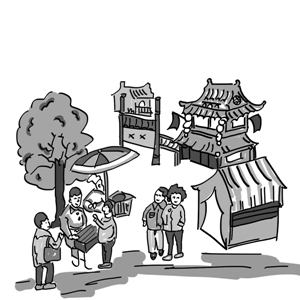
This week, the bad news is that "mutton" has been discovered in the city which was partly made up of duck, pork and even rats. I can only suggest that from now on it is advisable to eat at home and, even then, take care to ensure that the ingredients you use are of the highest quality.
The good news is that residents have a chance to experience a flavor of "old-Shanghai" in the city. The ongoing City God Temple Fair in downtown Shanghai that will run until May 19 has attracted a lot of public attention.
It's reported that this will be a Shanghai-style temple fair which will differ from the traditional type of temple fairs seen all over the country.
Traditionally, on the occasion of festivals and celebrations, temple fairs were organized for local people to buy all kinds of goods that might not normally be available. Locals could also enjoy performances such as lion dancing, acrobatics and circus acts.
Considering the lack of convenient transport, absence of one-stop shopping malls, and general low levels of disposable income, it was almost essential that such temple fairs were organized for rural people to take advantage of.
I remember clearly the excitement of the coming temple fair during my childhood. Both adults and children looked forward to it with relish. For example, grandparents would buy old-fashioned clothes or shoes. Our parents might purchase a new set of furniture and, if possible, a new set of affordable clothes for their children.
Meanwhile, youngsters could enjoy the kind of candies and snacks we had never tried before. Even with only a small amount of pocket money, we were more than happy to just wander around the fair feasting our eyes on everything available.
Today, with large-scale supermarket chains and cinemas popping up in almost every corner of the country, people can buy whatever they want either in shopping outlets or online. And at the same time, children have the comfort of all manner of electronic products and TV programs. What possible need would they have of the rather basic attractions of a temple fair? Which actually leads to the question of why such fairs should exist at all.
The selling point of the City God Temple Fair is "old Shanghai" flavors. What exactly are these old flavors? And will people buy them?
Shanghai's once famous national trademark products such as Baiqueling and Yashuang facial creams, and Bee Flower hair shampoo and conditioner, are back on sale at the temple fair. The traditional qipao is another highlight. Baiqueling has come to prominence of late because it was on the gift list of the new Chinese first lady, Peng Liyuan, when she accompanied her husband, Chinese President Xi Jinping, on his first State visits to four countries. Peng's "made-in-China" clothes were the equivalent of a free advertisement for the fashion company involved considering the large amount of news coverage her outfits received.
Of course, brands such as Baiqueling should spare no effort in taking advantage of such unmissable opportunities, particularly if it guarantees their future existence. The current reality is that the younger generation, to some extent, are obsessed with following foreign brand names.
On TV, magazine covers, and billboard advertising, we see world-famous celebrities advertising all manner of overseas cosmetics brands and their products. Domestic brands, meanwhile, are being squeezed with an ever-diminishing total market share. It's hard for these companies to survive, let alone compete.
Baiqueling isn't alone in this respect. Other famous national-level brands of yesteryear are part of the revival movement at temple fairs. Nostalgic middle-aged and senior Chinese consumers are happy to come across these old familiar names.
But nostalgia isn't enough. The purchasing power of such nostalgic feelings alone isn't enough to guarantee the success of these products. In fact, if a product is labeled as a "souvenir" it is basically admitting that it has no active place in the current market.
Gaining recognition from powerful consumer groups is the only way to remain competitive in a market economy. Consumers are tough and realistic. They pay for a product or service which they will compare with the competition and then decide who to remain loyal to. It's harsh, but fair. The first lady's choice in goods may bring some short-term influence and prosperity, but at the end of the day it is the quality of these products that will determine their long-term fate.
And this theory is equally applicable to temple fairs. Despite support from government departments, if all a temple fair has to offer are sweet memories and nothing of substance in the here and now, then they will be ruthlessly made obsolete by the market economy.
The author is the managing editor of Global Times Metro Shanghai. fengyu@globaltimes.com.cn

